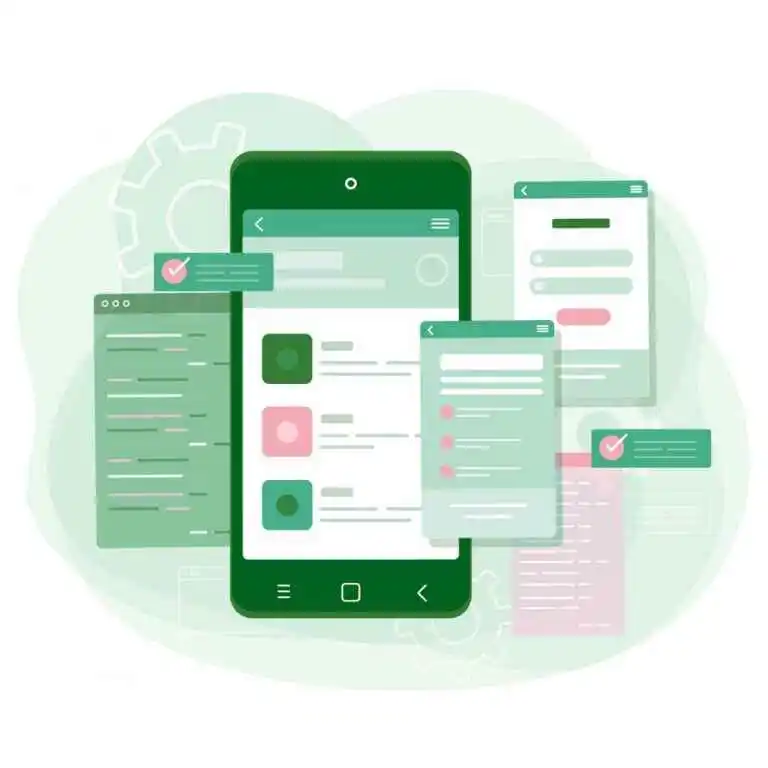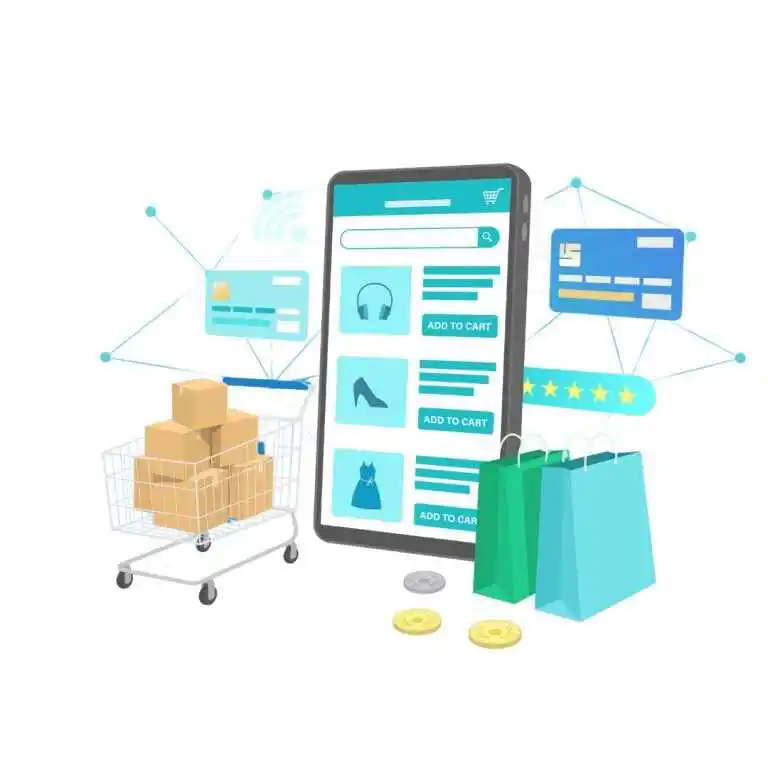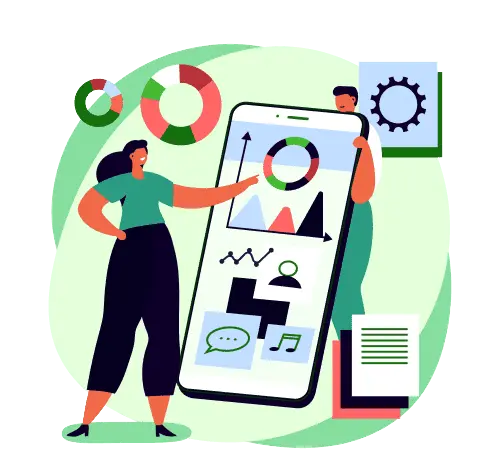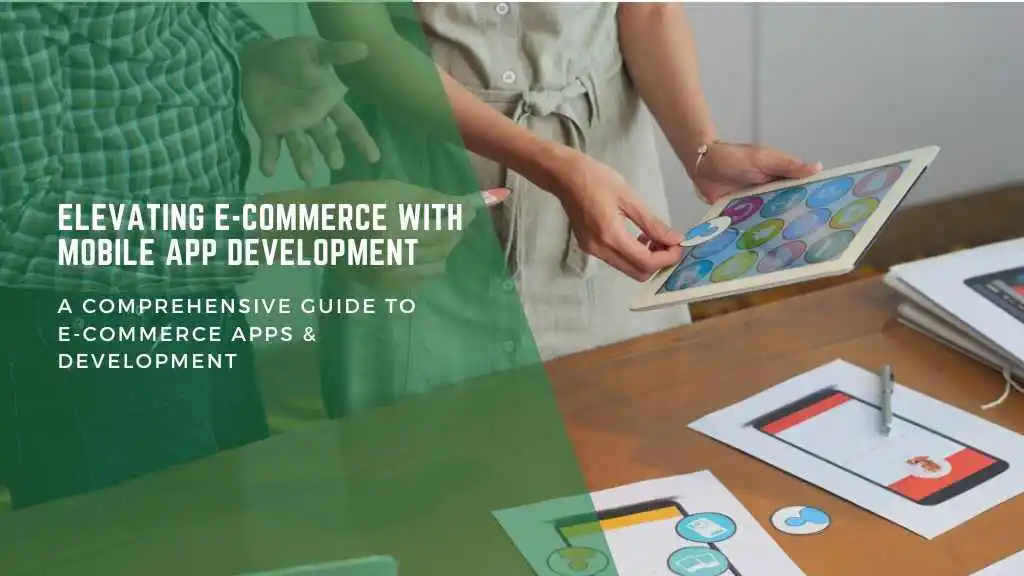Today, mobile devices have become vital in day-to-day life, influencing how people shop & interact with businesses. With the increasing craze of smartphones & tablets, consumers are more & more turning to mobile devices for shopping. The rise of m-commerce (Mobile Commerce) has reshaped the retail space, presenting new opportunities & challenges to capitalize on. Advanced mobile app development is playing a crucial role in m-commerce.
Role of Mobile Apps in E-commerce Growth
Mobile apps are essential for e-commerce growth as they provide businesses a direct channel to reach customers. Unlike mobile-responsive websites, mobile apps offer a more personalized & immersive shopping experience, cultivating customer loyalty and driving repeat purchases. As consumer behavior changes towards mobile-first interactions, e-commerce businesses must leverage the best mobile app development techniques to stay competitive in this evolving world of m-commerce.
Understanding Mobile App Development for E-commerce

Overview of Mobile App Development
Mobile app development involves the process of designing, building, and deploying software applications for smartphones & tablets. E-commerce mobile app development focuses on creating apps tailored to the unique needs & preferences of online shoppers, incorporating features such as product browsing, secure checkout, and order tracking.
Read More About: Android vs iOS Which is the Best Platform for App Development?
Key Features & Functionalities for E-commerce Apps
E-commerce apps typically include UI/UX development, intuitive navigation, product search functionality, user reviews & ratings, personalized recommendations, and checkout processes. Moreover, functionalities may also include push notifications for promotional offers, integration with social media platforms, and support for multiple payment methods to enhance the shopping experience.
Considerations for Choosing App Development Platforms
When selecting app development platforms, e-commerce businesses must consider target audience demographics, budget constraints, technical requirements, and scalability. Common mobile app development platforms include native development for iOS & Android, cross-platform frameworks like React Native & Flutter, and mobile app builders that offer drag-and-drop interface design.
Read More: Color Palette Generators for Website
Benefits of Mobile Apps for E-commerce Businesses

Enhanced User Experience
Mobile apps provide a more immersive and streamlined shopping experience than mobile-responsive websites, which enables faster navigation, smoother transitions, and optimized display of product images and descriptions.
Read More: Why is 2024 a Great Year to Start Your E-commerce?
Increased Engagement & Retention
E-commerce apps foster greater engagement and customer loyalty through personalized content recommendations, targeted promotions, and loyalty programs that incentivize repeat purchases and drive customer retention.
Personalized Shopping Experiences
By leveraging user data & behavioral analytics, e-commerce apps deliver personalized shopping experiences tailored to individual preferences & past purchase history. This ensures customer satisfaction and drives sales.
Must Read: The Future of E-commerce: Embracing SaaS Solutions
Smooth Integration with Device Capabilities
E-commerce apps can leverage the native capabilities of mobile devices, such as GPS for location-based services, a camera for visual search, and biometric authentication for secure login & payment verification.
Strategies for Effective Mobile App Development

User-Centric Design Principles
Prioritize user experience (UIUX) design principles like intuitive navigation, clear call-to-action buttons. And responsive layout to ensure the app is easy to use and visually appealing. Conduct user testing and gather feedback to iteratively improve the app’s design and functionality based on user preferences & behavior.
Read More: 10 Essential Tips for Launching Your E-commerce Journey with WooCommerce
Performance Optimization Techniques
Optimize app performance by minimizing loading times, optimizing code and assets. And leveraging caching mechanisms to ensure smooth and responsive user interactions. Implement lazy loading, image compression, and CDN integration to enhance app speed across different devices & network conditions.
Security & Privacy Considerations
Implement robust security measures to protect user data and transactions, including encryption protocols. Secure authentication methods, and adherence to compliance standards such as GDPR & PCI DSS. Regularly update the app with security patches and fixes to address vulnerabilities and mitigate potential data breach risks.
Read More: A Step-by-Step Guide to Website Optimization Strategies for 2024
Continuous Iteration & Improvement
Adopt an agile development approach to iteratively enhance the app’s features and functionality based on user feedback. Market trends, and performance analytics. Monitor app performance metrics such as user engagement and conversion rates to identify areas for improvement and optimize the app’s effectiveness over time.
Read More: Mastering E-commerce Expert Tips for Seamless Development
Bottom Line
Effective mobile app development requires a holistic approach encompassing user-centric design, performance optimization, security and privacy considerations, and continuous improvement. By incorporating these strategies into the development process. Businesses can create mobile apps that deliver exceptional user experiences, drive engagement, and achieve long-term success in the competitive app market.
FAQs
User-centric design focuses on creating apps that prioritize the needs & preferences of users to ensure a smooth experience.
Performance optimization ensures mobile apps load quickly and operate smoothly to enhance user satisfaction.
To ensure security & privacy, implement encryption, secure authentication methods, and regular updates to address vulnerabilities and comply with privacy regulations.
Continuous iteration involves refining & enhancing the app based on user feedback, market trends, and performance metrics regularly.
Mobile app development enhances customer engagement, loyalty, and sales by providing a personalized, convenient, and immersive shopping experience tailored to mobile users.
You can measure the success of your mobile app through user engagement, retention rates, conversion rates, and revenue generated through in-app purchases or transactions.
Written By
Author's Picks
- The Power of Personalization: Enhancing User Experience in E-commerce
- 06/05/2024
- What is B2B Commerce?
- 13/11/2024
- Top Customer Service Software Platforms for E-commerce Success
- 21/01/2025
Categories
- AI for Startups
- AI in Web Development
- AI Integration
- AI Platforms
- AI Prompt
- AI Tools
- AI Trading Software
- Android App
- Android vs iOS Development
- Angular
- API
- API Development
- App
- app development
- App Idea
- App User Feedback
- Application
- Artificial Intelligence
- Audit Services
- Automotive Industry
- Awards and Recognition
- Business Consulting
- Business Website
- Chatbots
- CRM
- CRM for Financial Advisors
- Custom CRM
- Custom SaaS
- Custom Website
- Customer Service
- dashboard design
- Developing a Mobile App
- Digital Business
- E-commerce
- EMR Integration
- Finance
- Financial Advisors
- Financial Advisors
- GIT
- Health Insurance
- iOS App
- iOS App Development
- IoT Mobile App Development
- IoT Platforms
- IT Audit Services
- IT Consulting
- IT Strategies
- Java Development
- Laravel
- Lean Canvas
- Learning Management System
- Logistics Apps
- Mobile App Development
- MVP
- Native App
- News Aggregator Site
- OTT
- Outsourcing IT
- Payment Gateway
- predictive analysis
- Product Launch Strategy
- Progressive Web App (PWA)
- Prototype
- Recommender Systems
- Ruby
- SaaS
- SaaS Application
- SaaS Business
- SaaS Company
- SaaS Development
- SaaS Product
- SaaS Project
- Sales Funnel
- SEO
- Shopping Cart
- Software Development
- SSL and TLS
- Startup Checklist
- Technology
- Tetradic Color Scheme
- UI/UX Design Company
- Unit Testing
- User Flow
- User Testing
- Web Development
- Web Performance Optimization
- website Maintenance Services
- Website Migration Service
- Website Speed Optimization
- WooCommerce
- WordPress





